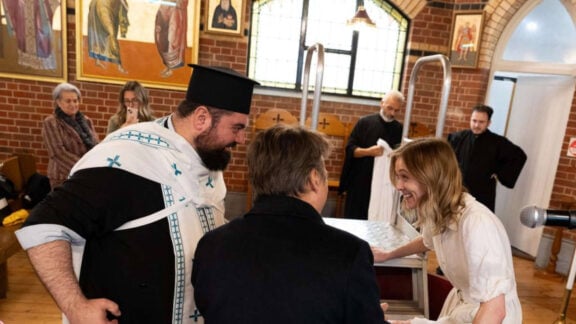Having worked and served on committees in the area of languages for many years, I feel very privileged to come into contact with many ethnic groups and I am pleased to see that the sector is thriving. Every experience in this area is also a life lesson, as communities strive to pass on their language and culture to their next generation.
In recent years community language schools have been proactive in meeting the challenges that have confronted them and have focussed on improving the quality of teaching and learning.
By bringing communities together through our community Language Associations and Community Languages, Australia has assisted in coordinating the efforts of many. It is now normal practice to conduct annual state conferences of Ethnic Schools, which grow each year in numbers.
Recently we launched “Love Of Language” website, and the concept of “Language Ambassadors”. We also introduced the Certificate IV in Community Language Teaching via several universities, which helps teachers to develop their skills.
Across Australia, there are Ethnic school days, community language school annual dinners and awards nights, a combined effort to encourage a positive approach to embrace language learning.
As for our Greek community, currently close to 12,500 students study the Greek language, proving that our beloved language has survived the test of time. Across Melbourne there are now more than thirty accredited community language schools offering Greek studies and the recent initiative “We speak Greek in March” has opened new horizons and a fresh enthusiasm for the learning of the language.
Now, unlike the decades of’ the ’60’s,’70’s and ’80’s, where we pushed our children to attend Greek school, our students come enthusiastically! As a community we have worked hard over the years and have undertaken a strong political push to ensure our language grew and was recognized. At present it seems there is some complacency and it is important not to lose this drive and endeavour politically. The question now is, how do we plan to maintain this for the decades ahead, as our first generation grows smaller every day and the demography changes.
We should aim to make Greek fashionable and “trendy”. The hope is it will become something popular, like a sport…. We should speak our language at home, at school, at work, when shopping,- wherever we meet another Greek speaker – Speak up!
Community Languages Australia has ignited the spark for a national conversation in relation to National Languages Policy. We have encouraged the Andrews’ Governments to restate its commitment to languages. The Minister for Education, The Hon James Merlino, issued a strong supporting statement in December 2015.
The scene is set. There is a call for us all to be responsible for speaking Greek, encouraging others to speak Greek.
In Australia, the Commonwealth and State Governments support the teaching of languages, and partly contribute funds to support the teaching of Greek and other languages. The Greek Government also contributed and is continuously assisting where possible. I remember some years ago when the Greek Government reduced the number of teachers being sent to the Diaspora, this angered the late Kostas Nikolopoulos.
With a well-written article he called upon the Greek National Centre to show “sensitivity and isomerism” after making comparisons with statistics and figures. It was found that Australia was disadvantaged. Since then, of course, much has changed, as the economic crisis of the country had to become the priority and the cuts were necessary!
Again, whenever we talked about our language, the words of this worthy journalist:”…Yes, Tasso, it is our responsibility and indeed we must shoulder our responsibilities, are relevant and should be seriously considered!
As a result of the crisis again, we have to acknowledge that we as a community, have been benefited as a big percentage of our Greek schools are able to employ teaching staff who came recently and naturally it’s enriching the language skills element in the classroom environment.
Again, we need to appreciate the fact that, the Greek State continues to provide some teachers to certain schools and beyond this, provides teaching material, including printed books to the Greek schools around the world and we need to be grateful.
We can and should shoulder the responsibility to support the educational practices: Lets us “adopt” in a sense a Greek project, for instance supporting a State school in promoting Greek. There are state schools that offer strong programs as well as our three Greek day schools.
– Let us embrace them and assist them in increasing these programs. We need to become ambassadors of our heritage – The cultural space in which we live in.
At the same time, we need to show our support to our after hours community language schools conducting classes during the week, or on Saturday. They are organized across Melbourne as is the Victoria School of Languages (VSL), which offers valuable programs, almost free.
The Parish schools of the Archdiocese in recent years have grown immensely and offer quality programs. The Schools of the Greek Community of Melbourne have a tradition of over a century and in recent years have developed their educational programs to meet the needs of newcomers with special programs as the Independent Greek Schools equally offer great educational programs, providing diversity of choice to the parents.
Yes, we have many philanthropic/cultural associations witch played an important role in the past but, as the years are changing the needs of our community are changing too, and it’s time to invest by contributing and supporting our Greek language and culture providers financially and continuously.
We must all take responsibility. We need to be vigilant and alert, think and act positively!
As an ending note, we need to remember that: Bilingual children have a greater chance of academic success and, learning Greek improves literacy, communication and problem-solving skills!
The Greek language, apart from linguistic and cultural attributes, offers the possibility of obtaining higher marks in university entrance exams. Studying Greek enables the candidate to have an advantage in the entrance exam, by obtaining an extra 10% (bonus mark).
Congratulations to all students who are studying our Greek language and we should recognize the efforts of parents, teachers and schools in this journey of embracing our language.
The challenge lies before us. The building blocks and strong foundations have been laid.
Let’s continue to build on these and promote our language and culture together. Let’s be proud of our Greek heritage.
*Tassos I Douvartzides is Chairman of the Australian Federation of Ethnic Schools Associations Community Languages Australia








